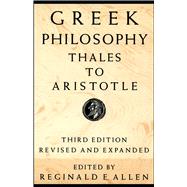
Note: Supplemental materials are not guaranteed with Rental or Used book purchases.
Purchase Benefits
What is included with this book?
| Preface To The Third Edition | |
| Introduction | |
| Presocratic Philosophy | |
| The Sources | |
| The Milesians | |
| Pythagoras and Pythagoreanism | |
| Heraclitus | |
| The Eleatics | |
| The Pluralists Plato | |
| Euthyphro | |
| Apology | |
| Crito | |
| Meno | |
| The Speech of Socrates in the Symposium(in part) | |
| Phaedo(in part) | |
| Republic(in part) | |
| Phaedrus(in part) | |
| Parmenides(in part) | |
| Timaeus(in part) | |
| Categories(in part) | |
| On the Soul(in part) | |
| Metaphysics(in part) | |
| Nicomachean Ethics(in part) | |
| Politics(in part) | |
| Physics(in part) | |
| Bibliography | |
| Index | |
| Table of Contents provided by Publisher. All Rights Reserved. |
The New copy of this book will include any supplemental materials advertised. Please check the title of the book to determine if it should include any access cards, study guides, lab manuals, CDs, etc.
The Used, Rental and eBook copies of this book are not guaranteed to include any supplemental materials. Typically, only the book itself is included. This is true even if the title states it includes any access cards, study guides, lab manuals, CDs, etc.
THE SOURCES
No work of the Presocratics has come down in its entirety. We possess fragments preserved by later authors, and testimony. The major sources are as follows:
A. Philosophers
(i) Plato gives useful information about his predecessors. Since he himself was not a historian of philosophy, his remarks must be treated with caution.
(ii) Aristotle surveyed his predecessors' testimony on the philosophical problems with which he himself was concerned. The Presocratics are thus made parties to his argument, not left to speak for themselves, and this often introduces a cast into his interpretation. Nevertheless, he was not without a sense of history, and his work is, and will remain a major source of knowledge.
(iii) The Stoics' method of interpretation was syncretistic: they undertook to show that their predecessors agreed with Stoic doctrine, and with each other.
(iv) Sceptics, such as Sextus Empiricus, were concerned to exhibit the contradictions of earlier philosophy, but preserved valuable fragments.
(v) The Neo-Platonists, especially Proclus, Alexander, and Simplicius, commented on Plato and Aristotle; with the library of the Academy at their disposal, they too preserved many fragments.
B. The Doxographical Tradition
Theophrastus, Aristotle's successor in the Lyceum, continued the Peripatetic interest in history. As part of the encyclopedia of knowledge projected by the school, Theophrastus wroteOn the Opinions of the Physical Philosophers,parts of which have come down to us. He consulted the original texts of the Presocratics, but his historical judgment was much influenced by Aristotle.
Theophrastus' work became the standard authority in the ancient world. The doxographers are those who derive their material, directly or indirectly, from theOpinions (doxai).The main sources in the doxographical tradition are Diogenes Laertius (probably third century A.D.), Plutarch (first-second century A.D.), and John Stobeaus (fifth century A.D.).
Copyright © 1966, 1985, 1991 by Reginald E. Allen
Excerpted from Greek Philosophy: Thales to Aristotle
All rights reserved by the original copyright owners. Excerpts are provided for display purposes only and may not be reproduced, reprinted or distributed without the written permission of the publisher.